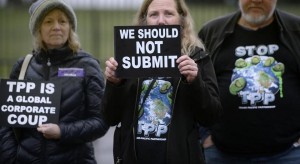RIP, TPP
< < Go Back
by Barney Frank,
Advocates of particular issues sometimes have to be reminded that presidential elections have consequences. One of the lessons people should learn this year is that so do primaries.
If voters deliver a clear enough message in the nominating process, it can determine public policy outcomes even before those nominated officially take office.
Exhibit A is the pending major trade bill, the Trans-Pacific Partnership. When the deal was concluded, its major backers — a rare bipartisan coalition of the president and the Republican congressional leadership — decided to defer action until this year’s lame-duck session. This reflected two linked realities: the increasing unpopularity of trade deals, and the fact that the immediate post-election period is the one in which voter influence on members is at its weakest.
Opposition to TPP was one of the few issues that most of the candidates agreed on this year. And strong opposition to the deal was not just a stand-alone position on one specific issue. It was one of the most important manifestations of a profound repudiation of what voters saw as a deeply unfair economic system, in which trade has played a significant role.
What impact should this overwhelming verdict have on the plan to ratify the pact in the post-election session? I can sum it up in six letters: RIP, TPP.
In part because its leading backers are the most powerful actors in our system — the president, the speaker, and the Senate majority leader — there are two reasons they should not even try to use their combined political muscle to push the bill through.
One: They will probably fail.
Two: They might succeed.
Figuring out a strategy to combat this excessive negativism among the public is hard. But it is easy to think of something that would greatly exacerbate it: having the president, the speaker, and the majority leader press a reluctant Congress to ratify a widely unpopular trade bill just weeks after a presidential campaign in which the overwhelming majority of voters selected two anti-TPP candidates for president, and elected one of them in November.
The degree to which this would confirm the view that the system is rigged for the rich and powerful and that the voters have no real say in what the federal government does can best be expressed by redesignating the meaning of TPP. It will signify The Pyrrhic Paradigm — the model of how to make a short-term gain that causes serious long-term harm.
I have been an opponent of TPP in its current form, because it is unaccompanied by measures to offset the degree to which it — like all trade pacts — increases inequality. But regardless of the merits, those who understand that public anger over the economic status quo has reached a level that will have damaging consequences for our ability to govern ourselves should do what they usually urge on others: put our long-term interest in the health of our democracy ahead of their particular economic concern.
More From The Boston Globe:




